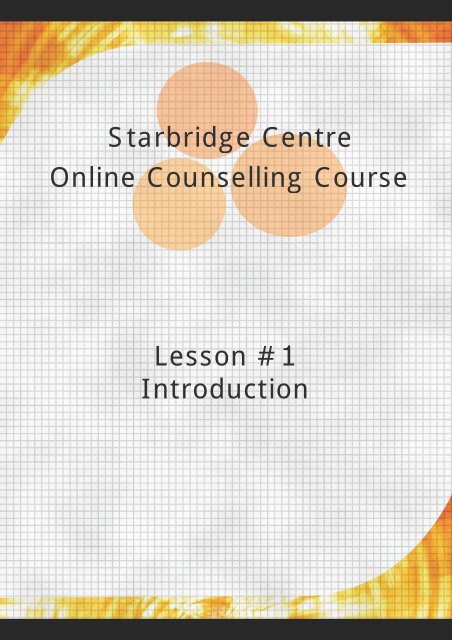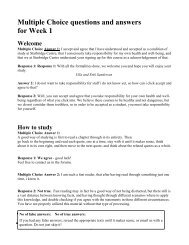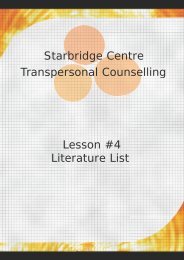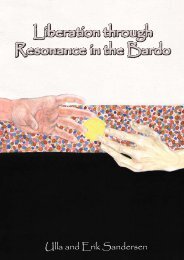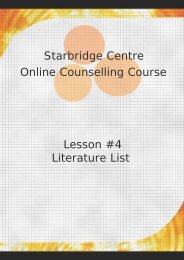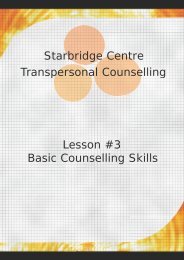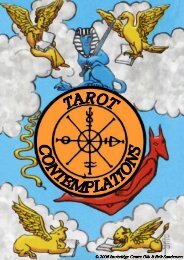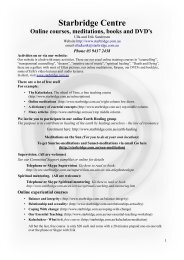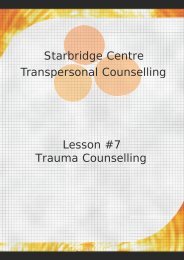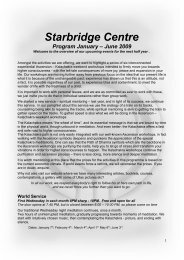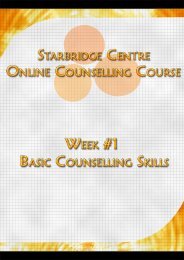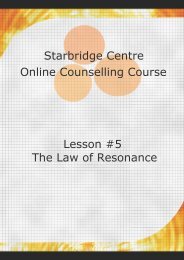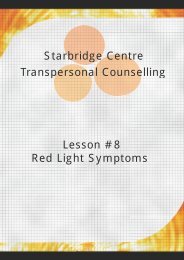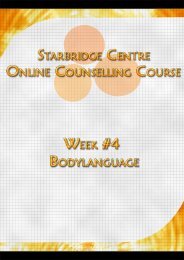Starbridge Centre Online Counselling Course Lesson #1 Introduction
Starbridge Centre Online Counselling Course Lesson #1 Introduction
Starbridge Centre Online Counselling Course Lesson #1 Introduction
Create successful ePaper yourself
Turn your PDF publications into a flip-book with our unique Google optimized e-Paper software.
<strong>Starbridge</strong> <strong>Centre</strong><br />
<strong>Online</strong> <strong>Counselling</strong> <strong>Course</strong><br />
<strong>Lesson</strong> <strong>#1</strong><br />
<strong>Introduction</strong>
Welcome To<br />
<strong>Starbridge</strong> <strong>Centre</strong>'s<br />
<strong>Online</strong> <strong>Counselling</strong> <strong>Course</strong><br />
This course has been throughout tested in the 8 successful years where it has been running as classteaching.<br />
The course focuses and in an easy readable style on important aspects of the main areas that any<br />
counsellor, regardless of way of working, needs to know, in order to deal with the vast and<br />
intriguing complexity that is the human being.<br />
We hope you can appreciate the depth and width of the teaching, and we ask, that you are alert to<br />
the many feelings these topics is bound to evoke, because it is by the process of acknowledging<br />
these feelings and their connections in your past present and future, that the real assimilation of the<br />
course will happen..<br />
Feel free to contact us by email and in the forums with feed back, questions etc.<br />
Thank you for Studying at <strong>Starbridge</strong> <strong>Centre</strong> e-learning<br />
We look forward to hearing from you<br />
Ulla and Erik Sandersen
No-one can be counsellors<br />
from theoretical knowledge alone<br />
Obviously these topics are close to home, they are meant to describe why we are how we are, so in<br />
order to study such a material, you need a honest attitude to yourself, and a readiness to seek help<br />
when needed.<br />
We ask of you that you consciously take responsibility for your own health and well-being,<br />
and we understand your signing up for this course as a acknowledgement of that.<br />
If you have any questions or comments, feel free to use our email or forums.<br />
If your question is of general interest, we invite you to also post it in the forum, or<br />
alternatively, allow us to do so.<br />
We offer face to face training and supervision both in individual sessions, and in groups at<br />
<strong>Starbridge</strong> (groups are offered according to need and time available).<br />
We continue to also offer the face to face certificate workshops where both teaching and training is<br />
integrated. The link to these courses can be found on the main menu.<br />
About this course<br />
The course is build up as a series of related quotes from many different sources, bound together by<br />
our own understanding of the topic at hand.<br />
You can either read this material as a online book, and leave it there, or, if you would like a formal<br />
recognition for your study, we give a certificate acknowledging your theoretical knowledge if you<br />
have written and we have assessed all four essays.<br />
It is our experience that a proper assimilation of this material will take at least 1/2 year.<br />
A good way of studying is first to read a chapter through in its entirety. Then<br />
go back to the beginning and read each quote, one at a time, stay with it until it makes sense, think<br />
about it in its own right, and then move to the next quote, and think about the related quotes as a<br />
whole.<br />
In short, do not just read, study.<br />
The theoretical part of the course consist of 47 topics. To help you check how much you have<br />
assimilated, each chapter conclude with a multiple choice test.<br />
If you have any questions or comments, feel free to use our forums, both the public ones and the<br />
specific forum for these courses. The idea is that the students will have a chance to discuss relevant<br />
topics with each other, and that the teachers can be asked questions.
The exam consists of two aspects:<br />
• That you have passed the individual multiple choice tests at the end of each chapter.<br />
• Four essays, Three on 2-pages and one on 4-pages. Essays must be based on material<br />
covered in the course, cross referenced with relevant quotes from the teaching and with<br />
additional sources from the literature<br />
Please note that since this is an exam in our teaching, the topics for your assignment, and the<br />
techniques and exercises described, must be anchored in our teaching.<br />
The essays needs to be written with cross references to the material and your personal comments to<br />
this. You are most welcome to a to agree or disagree with us, as long as we can follow your<br />
reasoning.<br />
Passing these two tests ensure a good theoretical understanding of the field. Only after both<br />
theoretical and practical training can one be fit is a practising counsellor.<br />
How the essays can be written<br />
not how you must do it:<br />
1: Choose a subject related to the curriculum that you want to write about<br />
2: Search the teaching material for clues on the topic<br />
3: Search the literature-list.<br />
4: Read the material<br />
5: Brain-storm - write down in arbitrary order your ideas<br />
6: Choose the good bits from the brain-storm, and put them into order<br />
7: Write a draft<br />
8: Read it<br />
9: Leave it a day or two<br />
10: Read it, add comments, new ideas etc.<br />
11: Leave it a day or two<br />
12: Read it<br />
13: Make a new draft<br />
14: Repeat steps 8 - 14 until you are satisfied.<br />
15: Remember cross-referencing between course notes and your comments!<br />
16: Don't be too critical - don't be too laid back<br />
17: Good luck!<br />
Please write your essay in your email format, or as word, open office or pdf format file attachments,<br />
and submit it to us on our email: exam@starbridge.com.au<br />
You will be emailed feedback etc. but it will also will appear in the forum on our website.<br />
Feel free to contact us in the forums
Multiple Choice questions for Week 1<br />
Welcome<br />
Multiple Choice Answer 1: True / False (Cross out the wrong answer): I accept and agree that I<br />
have understood and accepted as a condition of study at <strong>Starbridge</strong> <strong>Centre</strong>, that I consciously take<br />
responsibility for my own health and well-being, and that we at <strong>Starbridge</strong> <strong>Centre</strong> understand your<br />
signing up for this course as a acknowledgement of that.<br />
Multiple Choice Answer 1: True / False (Cross out the wrong answer): Answer 2: I do not want to<br />
take responsibility for stuff i do not know yet, so how can i click accept and agree to that<br />
About this course<br />
Multiple Choice Answer 1: True / False (Cross out the wrong answer): A good way of studying is<br />
first to read a chapter through in its entirety. Then go back to the beginning and read each quote,<br />
one at a time, stay with it until it makes sense, think about it in its own right, and then move to the<br />
next quote, and think about the related quotes as a whole.<br />
Multiple Choice Answer 2: True / False (Cross out the wrong answer): I am such a fast reader, that<br />
after having read through something just one time, i know it. Response 2: Well yes, fast reading<br />
may in fact be a good way of not being distracted, but there still is a vast distance between knowing<br />
facts, and having thought through different scenarios where to apply this knowledge, and double<br />
checking if you agree with the statements in these different circumstances. You have not properly<br />
utilized this material without that type of processing.


